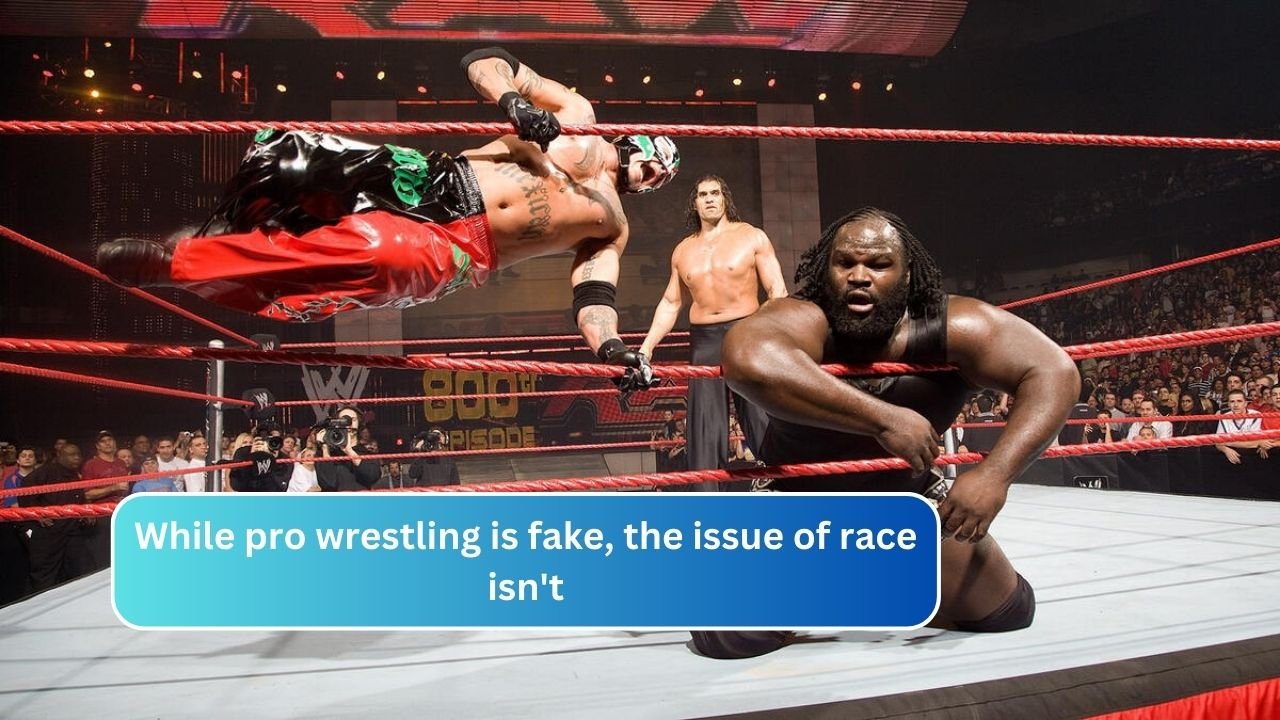Pro wrestling has long been a subject of debate, with many dismissing it as “fake” due to its scripted nature. But while the punches may be pulled and outcomes predetermined, there’s a much more significant issue that isn’t fake at all: race. Pro wrestling, like many forms of entertainment, has a complicated history when it comes to race and representation. This article delves into how the issue of race intersects with the world of professional wrestling, an industry that reflects both the progress and the challenges of our society.
The Entertainment Factor of Pro Wrestling
Pro wrestling is, at its core, entertainment. It’s a blend of athleticism, drama, and storytelling designed to captivate audiences. Wrestlers perform choreographed moves, and the outcomes of matches are predetermined by the writers. But this doesn’t mean that pro wrestling is entirely devoid of realness. The physical toll on wrestlers’ bodies is genuine, and the emotional connection fans have with the storylines is undeniable. Despite being scripted, the passion, dedication, and skill involved are very real, making wrestling a unique form of entertainment that continues to draw millions of viewers worldwide.
Understanding the Term “Fake” in Pro Wrestling
When people label pro wrestling as “fake,” they’re usually referring to the scripted nature of the matches. However, this term oversimplifies the reality of the industry. Yes, the matches are predetermined, and the rivalries are often fictional, but the physical demands on wrestlers are anything but fake. These athletes endure grueling schedules, intense training, and real injuries. Additionally, the emotional impact of storylines on both wrestlers and fans is genuine, showing that while the outcomes may be scripted, the experience of wrestling is far from fake.
Race and Representation in Pro Wrestling
Race has always been a critical issue in professional wrestling. Historically, the industry has struggled with its portrayal of different races and ethnicities, often resorting to harmful stereotypes and typecasting. The world of wrestling has mirrored society’s racial issues, sometimes perpetuating them through problematic storylines and characters. While there have been significant strides in improving representation, wrestling still has a long way to go in addressing the racial inequalities that exist both on and off the screen.
Early Days of Wrestling and Racial Stereotypes
In the early days of professional wrestling, racial stereotypes were rampant. Characters were often based on exaggerated and offensive depictions of different ethnicities. For example, African American wrestlers were frequently portrayed as savage or primitive, while Asian wrestlers were often depicted as sneaky or dishonorable. These caricatures reflected the broader societal prejudices of the time, reinforcing negative stereotypes and perpetuating racism.
Iconic Wrestlers of Color and Their Impact
Despite the industry’s issues with race, many wrestlers of color have made significant impacts in the world of professional wrestling. Figures like The Rock, Booker T, and Eddie Guerrero broke barriers and challenged stereotypes, proving that talent transcends race. These wrestlers not only achieved success in the ring but also became cultural icons, inspiring a new generation of wrestlers and fans alike. Their legacy continues to influence the wrestling industry today.
Challenges Faced by Wrestlers of Color
Wrestlers of color have faced numerous challenges throughout their careers. Discrimination behind the scenes, limited opportunities, and unequal pay have all been ongoing issues. Even when wrestlers of color achieve success, they are often subjected to racist remarks from both fans and colleagues. The lack of diversity in top-tier positions within wrestling organizations further exacerbates these challenges, making it difficult for wrestlers of color to reach their full potential.
The Role of Fans in Shaping Representation
Fans play a crucial role in shaping representation in professional wrestling. Their reactions to characters and storylines can influence how wrestling promotions develop and portray wrestlers of different races. The demand for more diversity and inclusive storylines has grown in recent years, leading to positive changes in representation. However, fan pressure can also work the other way, encouraging promotions to continue using stereotypes if they believe it will boost ratings.
WWE’s Role in Addressing Racial Issues
As the largest wrestling promotion in the world, WWE has a significant influence on how race is addressed in the industry. Over the years, WWE has taken steps to promote diversity, such as introducing more wrestlers of color in prominent roles and supporting initiatives that encourage inclusivity. However, the company has also faced criticism for its handling of racial issues, particularly regarding controversial storylines and the lack of diversity in its leadership. While WWE has made progress, there is still much work to be done.
Other Wrestling Promotions and Race
WWE is not the only wrestling promotion grappling with issues of race and representation. Other companies, such as All Elite Wrestling (AEW) and Impact Wrestling, have also faced challenges in this area. These promotions have taken different approaches to diversity, with some achieving more success than others. Comparing WWE’s efforts to those of other promotions can provide a broader perspective on the industry’s progress in addressing racial issues.
Racism in Wrestling Storylines
Professional wrestling has a history of using race as a central theme in its storylines. While some storylines have been praised for addressing racial issues thoughtfully, others have crossed the line into offensive territory. Examples include stereotypical portrayals of wrestlers based on their ethnicity and feuds that exploit racial tensions for entertainment. These storylines can have a lasting impact on both the wrestling community and society at large, highlighting the need for more responsible storytelling.
How Pro Wrestling Reflects Society’s Racial Issues
Professional wrestling often reflects the racial issues present in society. The portrayal of race in wrestling can serve as a mirror to the broader racial tensions and prejudices that exist outside the ring. Just as society grapples with issues of inequality and discrimination, so too does the world of professional wrestling. However, wrestling also has the potential to inspire change, using its platform to promote inclusivity and challenge harmful stereotypes.
Recent Progress in Racial Representation
In recent years, there has been notable progress in racial representation within professional wrestling. Wrestlers of color have been given more opportunities to shine, and storylines have become more inclusive. Champions like Kofi Kingston and Bianca Belair have shattered stereotypes, showing that success in wrestling is not limited by race. Additionally, wrestlers themselves have become vocal advocates for racial equality, using their platforms to push for positive change both within the industry and beyond.
The Future of Race in Pro Wrestling
The future of race in professional wrestling will depend on the actions of wrestlers, fans, and promotions alike. Continued advocacy for diversity, both in front of and behind the camera, will be crucial in ensuring that wrestling becomes more inclusive. The industry needs to prioritize representation and equality, allowing wrestlers of all races to reach their full potential without the limitations of stereotypes or discrimination. With the right steps, the future of pro wrestling can be one where talent, not race, defines success.
Conclusion
While professional wrestling may be “fake” in terms of its scripted nature, the issue of race within the industry is very real. The world of wrestling has made progress in addressing racial representation, but there is still much work to be done. By continuing to challenge stereotypes, promote diversity, and advocate for equality, the wrestling industry can become a more inclusive space for all.
FAQS
Is pro wrestling really fake?
Pro wrestling is scripted, but the physicality and athleticism involved are real. The outcomes are predetermined, but the effort and risks taken by wrestlers are genuine.
How has pro wrestling historically dealt with race?
Historically, pro wrestling has struggled with race, often relying on stereotypes and racially charged storylines. However, there has been progress in recent years.
Who are some influential wrestlers of color?
Wrestlers like The Rock, Booker T, and Kofi Kingston have been influential figures in breaking racial barriers in professional wrestling.
What challenges do wrestlers of color face?
Wrestlers of color often face discrimination, limited opportunities, and unequal pay within the industry. They also struggle with stereotypical portrayals in storylines.
How can pro wrestling improve racial representation?
Pro wrestling can improve racial representation by promoting diversity in both its talent and leadership, creating inclusive storylines, and addressing racial issues thoughtfully.










